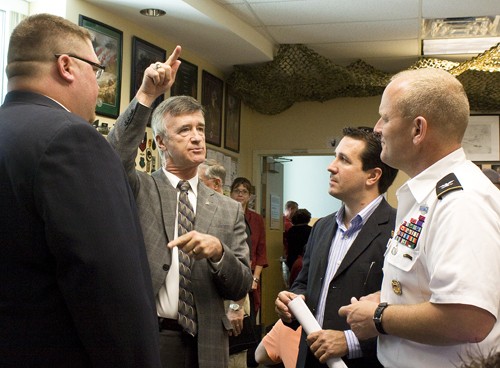Starting next semester, veterans will register early for classes along with UA athletes.
The UA Veterans Education and Transition Services office has been working for about a year and half to give veterans priority registration.
The news was announced to cheers during the V.E.T.S. welcome back event.
“”You’ve still got to fight for classes, but you’re fighting with less students,”” said Vice President of Student Affairs Melissa Vito. “”Everyone worked so that the proposal that we put together was really, really solid and really good and really neat.””
The priority registration will help make sure that veterans are able to stay on track to getting their degree and receive the funds they need to go to school.
“”It helps us out a lot as far as getting the classes we need,”” said psychology junior and veteran Corrissa Burt.
Through the G.I. Bill, veterans are able to have their degrees paid for but only if they finish within 36 months. If they go beyond that, they are on their own.
“”If you miss one class and it offsets your semester by one you have a whole semester, you have to pay for by yourself,”” said V.E.T.S. Vice President Robert Rosinski. “”So if you are a freshmen and you are just starting and you already missed that one semester, you just kind of look at it and go well, I’m already screwed.””
When the V.E.T.S. office began, it averaged six veterans a day — now around 120 veterans visit the office each day.
The office now has veterans swipe their CatCards in order to measure attendance.
When veteran Dewdney Liburd started his academic career at the UA the V.E.T.S. office was able to help him begin his academic career. And now, as a work-study employee, he is able to help others do the same.
“”Now I’m at the position where I can be the one on the other end,”” Liburd said.
“”It’s an awesome feeling, you have that pride of knowing you’ve helped someone.””
Rosinski says the office strives for “”veterans helping veterans.””
The work-study students that staff the office are paid through the Veteran’s Association, which means they are of no cost to the UA.
In addition to helping veterans find academic success, the V.E.T.S. office strives to provide a social component for veterans. Veterans often have difficulty dealing with the many UA students whose first priority isn’t their education.
“”It’s easier to be around fellow vets. (Freshmen) don’t have, as I like to call it, the team mentality,”” Liburd said.
The office has its own psychologist who’s free and available from 8 a.m. to 5 p.m. on Tuesdays. The office also has a post-traumatic stress disorder support group whose attendance is twice as high as the VA’s national average.
According to Rosinski, V.E.T.S. students at the UA average close to a 3.0 GPA or better and have a 94 percent retention rate.









